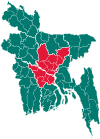Singair
সিঙ্গাইর | |
|---|---|
 Kaliganga River, Jamsha Union | |
 | |
| Coordinates: 23°48′55″N 90°08′03″E / 23.81528°N 90.13417°E | |
| Country | |
| Division | Dhaka |
| District | Manikganj |
| Area | |
| • Total | 221.45 km2 (85.50 sq mi) |
| Population | |
| • Total | 328,125 |
| • Density | 1,500/km2 (3,800/sq mi) |
| Time zone | UTC+6 (BST) |
| Postal code | 1820[2] |
| Area code | 0651[3] |
| Website | Official Map of Singair |
Singair (Bengali: সিঙ্গাইর) is an upazila of Manikganj District in the Division of Dhaka, Bangladesh.[4]
Geography

Singair is located at 23°49′00″N 90°09′00″E / 23.8167°N 90.1500°E. It has 65,058 households and total area 221.45 km2.
Demographics
According to the 2011 Census of Bangladesh, Singair Upazila had 65,058 households and a population of 287,451. 62,790 (21.84%) were under 10 years of age. Singair had a literacy rate (age 7 and over) of 46.19%, compared to the national average of 51.8%, and a sex ratio of 1041 females per 1000 males. 26,885 (9.35%) lived in urban areas.[6][7]
As of the 1991 Bangladesh census, Singair has a population of 461628. Males constitute 50.47% of the population, and females 49.53%. This Upazila's eighteen up population is 267789. Singair has an average literacy rate of 21.1% (7+ years), and the national average of 32.4% literate.[8]
Administration
Singair Upazila is divided into Singair Municipality and 11 union parishads: Jamsha, Charigram, Singair, Dhalla, Bayra, Chandhar, Baldahara, Joymontop, Jamirta, Saista, and Talibpur. The union parishads are subdivided into 137 mauzas and 241 villages.
Singair Municipality is subdivided into 9 wards and 14 mahallas.[9]
Education
There are three colleges in the upazila.[10]
According to Banglapedia, Dakkhin Jamsha High School founded in 1969, Basiruddin Foundation High School (Jamsha Union), Baira High School (1949), Charigram S A Khan High School (1948), Golaidanga High School (1967), Jamirta SG Multilateral High School (1921), Talebpur Adarsho High school (1973), Joymontop High School (1929), Nabagram Multilateral High School (1921), Shahrail High School (1964), Singair Pilot High School (1940), and Singair Pilot Girl's High School are notable secondary schools.[4]
See also
References
- ^ National Report (PDF). Population and Housing Census 2022. Vol. 1. Dhaka: Bangladesh Bureau of Statistics. November 2023. p. 398. ISBN 978-9844752016.
- ^ "Bangladesh Postal Code". Dhaka: Bangladesh Postal Department under the Department of Posts and Telecommunications of the Ministry of Posts, Telecommunications and Information Technology of the People's Republic of Bangladesh. 20 October 2024.
- ^ "Bangladesh Area Code". China: Chahaoba.com. 18 October 2024.
- ^ a b MA Ramzan (2012), "Singair Upazila", in Sirajul Islam and Ahmed A. Jamal (ed.), Banglapedia: National Encyclopedia of Bangladesh (Second ed.), Asiatic Society of Bangladesh
- ^ Population and Housing Census 2022 - District Report: Manikganj (PDF). District Series. Dhaka: Bangladesh Bureau of Statistics. June 2024. ISBN 978-984-475-255-9.
- ^ "Bangladesh Population and Housing Census 2011 Zila Report – Manikganj" (PDF). bbs.gov.bd. Bangladesh Bureau of Statistics.
- ^ "Community Tables: Manikganj district" (PDF). bbs.gov.bd. 2011.
- ^ "Population Census Wing, BBS". Archived from the original on 2005-03-27. Retrieved November 10, 2006.
- ^ "District Statistics 2011: Manikganj" (PDF). Bangladesh Bureau of Statistics. Archived from the original (PDF) on 13 November 2014. Retrieved 14 July 2014.
- ^ "List of Colleges" (XLS). Secondary and Higher Education Division. 2016. Retrieved 25 July 2017.









